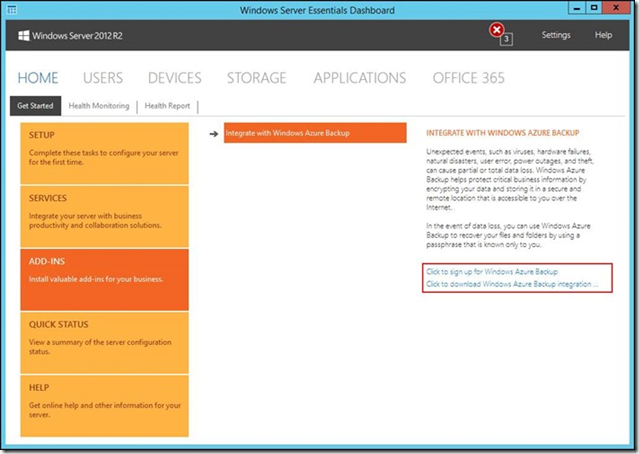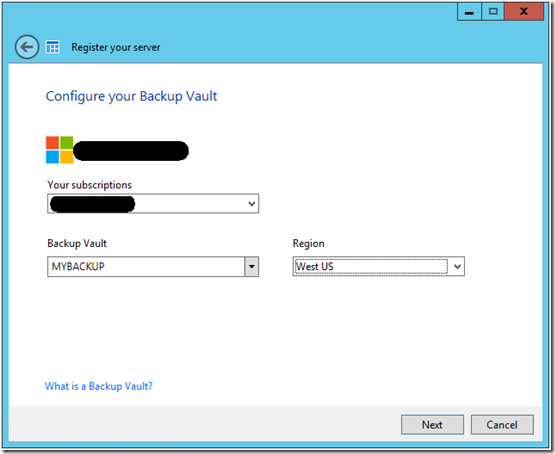[This post comes to us courtesy of Sabir Chandwale and Sandeep Biswas from Global Business Support]
Microsoft Azure Backup is a cloud-based backup solution that enables online backup and restore of important data to help protect against loss and corruption. This feature can be comfortably integrated to the Windows Server Essentials Dashboard.
Here are some significant features of Microsoft Azure Backup:
- Simplified setup and configuration via Windows Server Essentials Dashboard
- Incremental backup
- Data compression and encryption
- Retention policies
- Bandwidth throttling
Get started by installing add-in for Microsoft Azure Backup
1. Open the Windows Server Essentials Dashboard. Navigate to HOME tab and then click ADD-INS under the Get Started sub-tab

2. Select Integrate with Windows Azure Backup , and then click the following links to sign up and download the Online Backup Module respectively:
-
Click to sign up for Windows Azure Backup
You may opt for a free trial for a month or you may purchase the services
-
Click to download Windows Azure Backup integration module
Download and save the file OnlineBackupAddin.wssx
3. Install the Online Backup integration module by running OnlineBackupAddin.wssx. Follow the wizard to complete the installation. After the installation wizard successfully completes, reopen the Dashboard
4. A new tab named AZURE BACKUP appears on the Windows Server Essentials Dashboard containing the common online backup/restore administrative tasks. It consists of the following sub-tabs:
- Azure Backup : After you register the server for online backup, this section displays the current backup status, storage status, and account information
- Protected Folders : Here you will find the list of all shared folders and File History folders on the server, and any other folders that you have selected to back up in Windows Azure
- Backup History : This section would list recent backup and restore operations
Configuring and Registering Server for Microsoft Azure backup
There are two ways in which we can configure a Windows Server Essentials to backup data on Azure:
-
Create a backup vault under “Recovery Service” and register the server using Windows Server Essentials Dashboard
-
Directly run the “Register the server backup” wizard
Note : Prior to the update for Windows Azure Recovery Agent it was mandatory to create backup vault before registering the server. After the update it is no longer required to first create a backup vault under recovery service. This can be done while registering the server.
Registering your server
1. Navigate to the AZURE BACKUP tab on the Windows Server Essentials Dashboard
2. In the Azure Backup page, click Register this server for backup under Azure Backup Task

3. Click on “Sign in”


4. Once the sign in is successful we get to a page wherein we can choose to create a new backup vault or chose an existing one which has been created earlier in the Azure Portal. In addition, if we have more than one subscription being managed we can choose the subscription as well

5. Once the server has been configured with Azure Recovery Service we get the option to choose the files and folders which can be selected to be backed up
6. By default, we have the following options selected:
a. Company
b. File History Backups
c. Folder Redirection
d. Users
7. In addition to this we Add Folders which are intended to be backed up

8. We get the following result once the registering of server has been completed

This completes the configuration and you are ready to use Microsoft Azure backup.
As the backups are taken, you would start seeing the same in the Backup History page of the Azure BACKUP tab on the Windows Server Essentials Dashboard . You can see these backups on the Azure portal as well.
 Microsoft
Microsoft